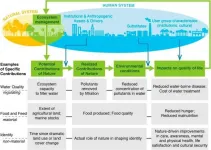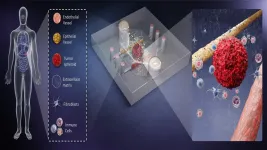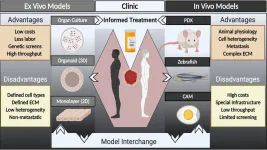INFORMATION:
Age-based COVID-19 vaccine strategy that saves most lives prioritizes elderly, modeling shows
2021-01-21
(Press-News.org) Vaccinating people over 60 is the most effective way to mitigate mortality from COVID-19, a new age-based modeling study suggests. Although vaccination of younger adults is projected to avert the greatest incidence of disease, vaccinating older adults will most effectively reduce deaths, the analysis shows. Less than one year after SARS-CoV-2 was identified, deployment of multiple vaccines against the virus has been initiated in several countries. Although vaccine production is being rapidly scaled up, demand will exceed supply for the next several months. An urgent challenge is the optimization of vaccine allocation to maximize public health benefit. To quantify the impact of COVID-19 vaccine prioritization strategies on cumulative incidence of the disease, mortality, and years of life lost, Kate Bubar and colleagues used a mathematical model to compare five age-stratified prioritization strategies. The approach varied assumptions about the total available vaccine supply, country-specific age structure, and age-varying efficacy of a hypothetical vaccine. It used data from countries around the world. In one of the modeling strategies using a highly effective, transmission-blocking vaccine prioritized to adults ages 20-49 years, cumulative disease incidence was minimized. However, in most scenarios where the vaccine was prioritized to adults over 60, mortality and years of life lost were minimized. This suggests optimal benefit - in the terms Bubar et al. evaluated - comes from prioritization of older individuals. If a vaccine is less efficacious in older adults, however, priority could be given to younger age groups, the authors say. To increase the available doses, further priority should be given to seronegative individuals, say the authors, whose work also assessed target-based vaccinations focused on serological status; vaccinating seronegative individuals improved efficiency of the vaccine in reducing overall transmission. The framework the authors applied can be used to compare impacts of prioritization strategies in other contexts, they say. They note several limitations of their study, including that it considers variation in disease risk only by age. They note that "other considerations are crucial, from equity in allocation between countries to disparities in access to healthcare, including vaccination, that vary by neighborhood."
In a related Perspective, Meagan Fitzpatrick and Alison Galvani discuss how the study by Bubar and colleagues suggests the optimal approach for COVID-19 vaccination is different than the optimal strategy for influenza vaccination, which indicates giving vaccines to school-age children as the priority. "Although it may seem intuitive that the optimal strategies against influenza and COVID-19 would be identical," Fitzpatrick and Galvani write, "vaccine optimization is not one size fits all, even for apparently similar pathogens." Shifts necessitating vaccinating older people first for SARS-CoV-2 are related to various factors, they say, including that the average number of secondary infections arising from a single SARS-CoV-2 case, when everyone is assumed to be susceptible, is typically double that of influenza virus. What's more, influenza vaccines have variable age-specific efficacy, with reduced protection for older people; so far, data from ongoing phase III clinical trials of a SARS-CoV-2 vaccines has shown similar efficacy across age groups.
ELSE PRESS RELEASES FROM THIS DATE:
Why older adults must go to the front of the vaccine line
2021-01-21
Vaccinating older adults for COVID-19 first will save substantially more U.S. lives than prioritizing other age groups, and the slower the vaccine rollout and more widespread the virus, the more critical it is to bring them to the front of the line.
That's one key takeaway from a new University of Colorado Boulder paper, published today in the journal Science, which uses mathematical modeling to make projections about how different distribution strategies would play out in countries around the globe.
The research has already informed policy recommendations by the Centers for Disease ...
The downward trend: Nature's decline risks our quality of life
2021-01-21
It is no secret that over the last few decades, humans have changed nature at an ever-increasing rate. A growing collection of research covers the many ways this is impacting our quality of life, from air quality to nutrition and income. To better understand how which areas are most at risk, scientists have combed through volumes of literature to present global trends in the relationship between human wellbeing and environmental degradation.
Their work, which included Fabrice DeClerck from the Alliance of Bioversity International and CIAT, was summarized in "Global trends in nature's contributions to people", which was recently published in Proceedings of the National Academy of Sciences.
This systematic ...
Combining best of both worlds for cancer modeling
2021-01-21
WASHINGTON, January 21, 2021 -- Despite cancer being a leading cause of death worldwide, treatment options for many types of cancers remain limited. This is partly due to the in vitro tools used to model cancers, which cannot adequately predict the behavior of a cancer or its sensitivity to drugs.
Further, animal models, like mice, biologically differ from humans in ways that play a critical role in immunotherapy, and results from animal studies do not always translate well to human disease.
These shortcomings point to a clear need for a better, patient-specific model to improve the understanding of cancer cells and their impacts.
Researchers from the University of Wisconsin and the University ...
Medicated drops may help close macular holes, helping some patients avoid surgery
2021-01-21
Medicated drops may help close small macular holes over a two- to eight-week period, allowing some people to avoid surgery to fix the vision problem, a new study suggests.
The findings, based on a retrospective multicenter case series published Dec. 15, 2020, in Ophthalmology Retina, could lead to a better understanding of which patients may benefit from the treatment, as well as the timeline of the treatment's effectiveness.
"For certain patients, medicated drops may heal their macular hole by decreasing inflammation and increasing fluid absorption in the retina," said ophthalmologist and retinal surgeon Dimitra Skondra, MD, PhD, senior author of the study. Skondra is an associate professor of ophthalmology and visual ...
Personalizing cancer care with improved tumor models
2021-01-21
WASHINGTON, January 21, 2021 -- Cancer is a major, worldwide challenge, and its impact is projected to escalate due to aging and growth of the population. Researchers recognize that new approaches to diagnose and treat deadly cancers, including identifying new drugs to treat cancer, will be essential to curbing the growing impact of the disease.
While decades of investment in research have resulted in substantial improvements in surviving cancer, a key challenge remains in identifying new drugs that improve outcomes for cancer patients, particularly for cancers when tumors have spread throughout the body.
In APL Bioengineering, by AIP Publishing, researchers suggest a major hurdle to identifying new drugs is the paucity of models -- organisms ...
Study finds bilateral agreements help developing economies spur foreign investment
2021-01-21
EUGENE, Ore. -- Jan. 21, 2021 -- Developing economies suffer from a paradox: they don't receive investment flows from developed economies because they lack stability and high-quality financial and lawmaking institutions, but they can't develop those institutions without foreign funds.
A study co-authored by Brandon Julio, a professor in the Department of Finance at the University of Oregon's Lundquist College of Business, found that bilateral investment treaties, commonly known as BITs, can help developing economies overcome this paradox, but only as long as those ...
Study finds genetic clues to pneumonia risk and COVID-19 disparities
2021-01-21
Researchers at Vanderbilt University Medical Center and colleagues have identified genetic factors that increase the risk for developing pneumonia and its severe, life-threatening consequences.
Their findings, published recently in the American Journal of Human Genetics, may aid efforts to identify patients with COVID-19 at greatest risk for pneumonia, and enable earlier interventions to prevent severe illness and death.
Despite the increasing availability of COVID-19 vaccines, it will take months to inoculate enough people to bring the pandemic under control, experts predict. In the meantime, thousands of Americans are hospitalized and die from COVID-19 each ...
How to get more electric cars on the road
2021-01-21
A new study from researchers at MIT uncovers the kinds of infrastructure improvements that would make the biggest difference in increasing the number of electric cars on the road, a key step toward reducing greenhouse gas emissions from transportation.
The researchers found that installing charging stations on residential streets, rather than just in central locations such as shopping malls, could have an outsized benefit. They also found that adding on high-speed charging stations along highways and making supplementary vehicles more easily available to people who need to travel beyond the single-charge range of their electric vehicles could greatly increase the vehicle electrification potential.
The findings are reported today in the journal Nature Energy, in a paper by MIT associate ...
New study: nine out of ten US infants experience gut microbiome deficiency
2021-01-21
DAVIS, Calif., January 21, 2020 - A new peer-reviewed study reveals that the vast majority of U.S. infants may be suffering from a substantial deficiency in an important bacterium key to breast milk utilization and immune system development, as well as protection against gut pathogens linked to common newborn conditions such as colic and diaper rash.
According to the study published today in END ...
Snake sex chromosomes say less about sex and more about survival
2021-01-21
Sex-specific chromosomes are a dangerous place to be, if you're a gene. Because these chromosomes -- Y chromosomes, in humans -- do not have a matching chromosome with which to exchange genetic information, they are prone to losing non-essential genes left and right in a process called genetic decay.
Now, a new study from research scientist Daniel Winston Bellott in the lab of Whitehead Institute Member David Page broadens our understanding of what makes a gene able to survive on a sex-specific chromosome by looking at one especially slithery branch of the evolutionary tree: snakes.
Comparing surviving genes on snake ...





